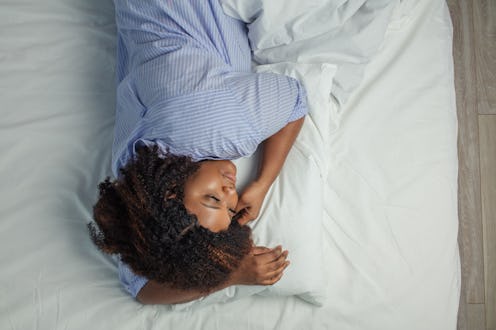Life
Yes, Heat Can Affect Your Sleep — Here's How Your Body Reacts

Even though it feels great to climb into a warm bed, sleeping in a hot room can impact the body in a way that makes it difficult to get good rest. So if you're in the habit of turning up the thermostat at night, you might want to consider leaving it where it is or turning it down in the evening hours. And this is true even in the winter, when your apartment will obviously be at its chilliest.
"Our bodies like to be cool when we transition from an awake state to a sleep state," Dr. Sujay Kansagra, the director of Duke University’s pediatric neurology sleep medicine program and a sleep expert at Mattress Firm, tells Bustle. The change in temperature signals that it's time to sleep. But if you're cooking away in a heated room, that process will be thrown off.
A warm room can also lead to sweating and other sleep disruptions throughout the night, even if you don't feel hot when you're drifting off. "If you are uncomfortable at night, you may not get into the deeper states of sleep and wake up unrefreshed," Kansagra says. And over time, the lack of sleep can catch up with you and impact your health.
"The most noticeable manifestation during the day for adults is sleepiness and fatigue," Kansagra says. "Mood often suffers with sleep deprivation, as does the attention span. Other areas of health that are affected include heart health, immune function, and appetite regulation." The list of potential side effects from poor sleep goes on and on, he says, which is why it's so important to do whatever you can to get enough rest.
Aside from feeling groggy or waking up sweaty, another sign your room may be too hot is if you have a hard time falling asleep. "The body's thermoregulation processes help control our sleeping patterns much in the same way that our circadian rhythm does," Ashley Little, CSSC, a certified sleep science coach at Mattress Advisor, tells Bustle. "During the evenings, our body temperature lowers to help us become drowsy and fall asleep. Then, in the morning hours, our body temperature rises to stimulate us and help us wake up. A disruption in a temperature can have a larger impact on your sleeping patterns than you may imagine because of this."
It might take some time to get used to sleeping in a cooler room, but creating a chillier environment can make a big difference. The ideal temperature is anywhere between 68 and 72 degrees Fahrenheit, Kansagra says, and all it requires is turning down the thermostat or opening a window. That doesn't mean you have to lie in bed shivering, however.
"You can still cuddle up in blankets," Little says, "just make sure your head is exposed to the cooler temperature, or avoid tucking the covers in to get better airflow and disperse your body heat." Having your head exposed to the cooler surrounding air, or even a leg or an arm, can be enough to regulate your body temperature.
If you're naturally hot, Kansagra suggests sleeping in a T-shirt and shorts. And if you run cold, he suggests adding layers of blankets to your bed, rather than turning up the heat. "If a person often finds themselves sweating at night, they should consider the types of clothing they wear to bed or their bedding," he says.
It can also help to warm up before bed by taking a hot shower. "Your body temperature falls when you go to sleep," Kansagra says. "A hot nighttime shower can help you fall asleep, because it artificially raises the body temperature for a short period of time so that when you step out of the shower, you experience a rapid drop in temperature. This temperature drop can help get you snoozing in no time!"
While a steamy room may seem welcoming at night, you'll actually sleep a lot better in a cooler environment with layers of blankets or pajamas you can add on or peel off as necessary. If you wake up sweating, or feel as if you aren't getting a good night's sleep, check your room's temp, as it very well may be the culprit.
Experts:
Dr. Sujay Kansagra, director of Duke University’s pediatric neurology sleep medicine program and sleep expert at Mattress Firm
Ashley Little, CSSC, certified sleep science coach at Mattress Advisor
This article was originally published on